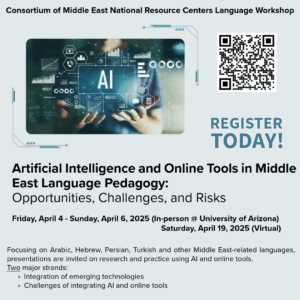 The 2025 Consortium of Middle East National Resource Centers Language Workshop
The 2025 Consortium of Middle East National Resource Centers Language Workshop
April 4-5, 2025 (in-person at the University of Arizona) and April 19, 2025 (online)
Keynote Speakers:
- Robert Godwin-Jones (Professor in the School of World Studies, Virginia Commonwealth University)
- Elsayed Issa (Assistant Professor of Computational Linguistics and Arabic in the School of Languages and Cultures, Purdue University)
➣ For the recording and schedule details–visit: https://cercll.arizona.edu/melanguage- workshop/.
Recently, Artificial Intelligence (AI) and online tools have shown to be useful and create breakthroughs for language learning and teaching. They have opened new opportunities for how to think about language learning and teaching in a myriad of environments and contexts. In particular, AI has offered personalized and optimized tools and platforms which use chatbots and virtual language tutors to provide real-time feedback, simulate immersive language environments, and engage learners in conversational practice. Educators, learners, and testing agencies are constantly developing pedagogies that can cope with AI-generated tools as invaluable assets. Pedagogy experts have also raised crucial issues about the challenges and risks that need to be carefully considered when these tools are used. This dynamic conversation has made greater progress in commonly taught languages than in the less commonly taught ones, including Middle East Languages.
The Center for Middle Eastern Studies at the University of Arizona in collaboration with UT-Austin’s Center for Middle Eastern Studies, University of Indiana’s Center for the Study of the Middle East, Georgetown University’s Center for Contemporary Arab Studies, SUNY-Binghamton University’s Center for Middle Eastern and North African Studies, along with the Center for Educational Resources in Culture, Language and Literacy, are pleased to announce the 2025 Consortium of Middle East National Resource Centers Language Workshop. With focus on Arabic, Hebrew, Persian, Turkish, and other related Middle East Languages, this event will focus on research and practice using AI and online tools. Workshop presentations will address classroom projects that explore the potential of AI and online tools in Middle Eastern languages. The event will be held at the University of Arizona on April 4th – 6th, 2025 (in-person) and online, on April 19th, 2025.
Submissions are no longer being accepted, but the CFP requested presentations related to the following topics (though other topics were considered as well).
1) Integration of emerging technologies such as:
- Text simplification tools
- Natural Language Processing (NLP)
- Machine learning algorithms
- Chatbots and virtual language tutors
- Personalization and adaptive learning
- Real-time feedback and assessment
- Gamification and immersive experiences
- Virtual exchange and tele-collaborations and linguistic and cultural learning
- AI and proficiency and language skills assessment tools
2) Challenges of integrating AI and online tools:
- Overreliance and loss of interaction in the classroom
- Technical issues and language specific characteristics including script
- Inequality in access and affordability
- Biases in language and cultural representations
Questions? Contact Dr. Julie Ellison.

